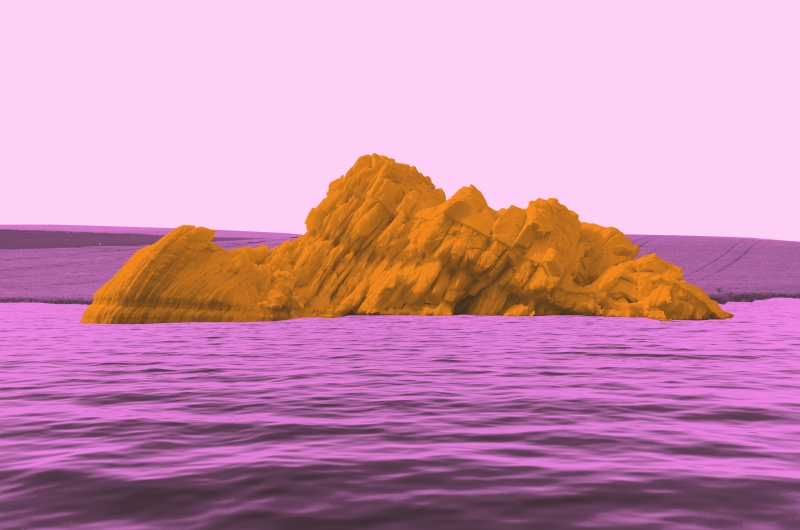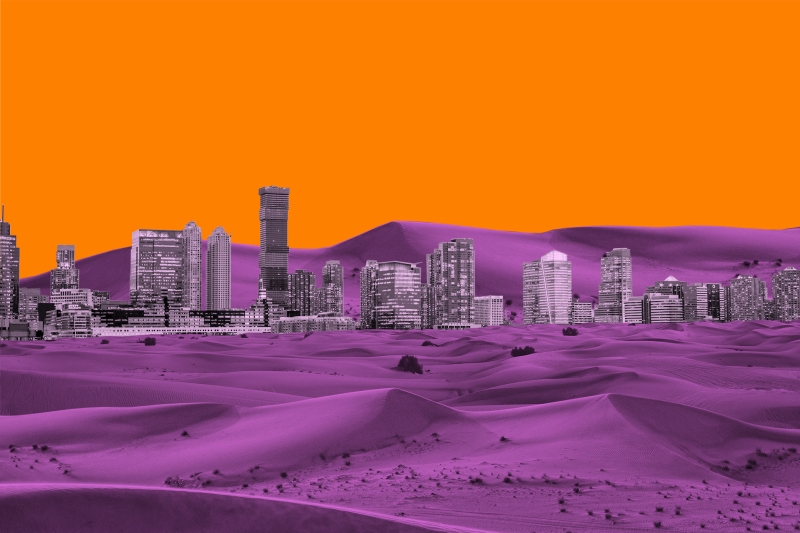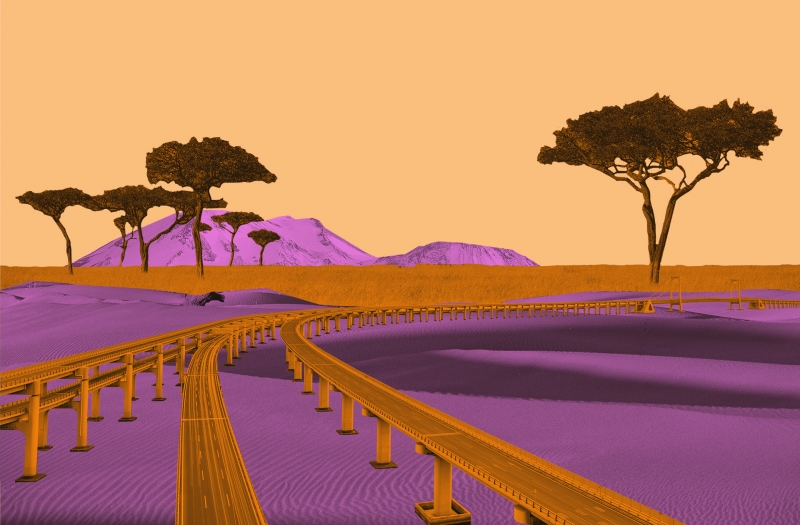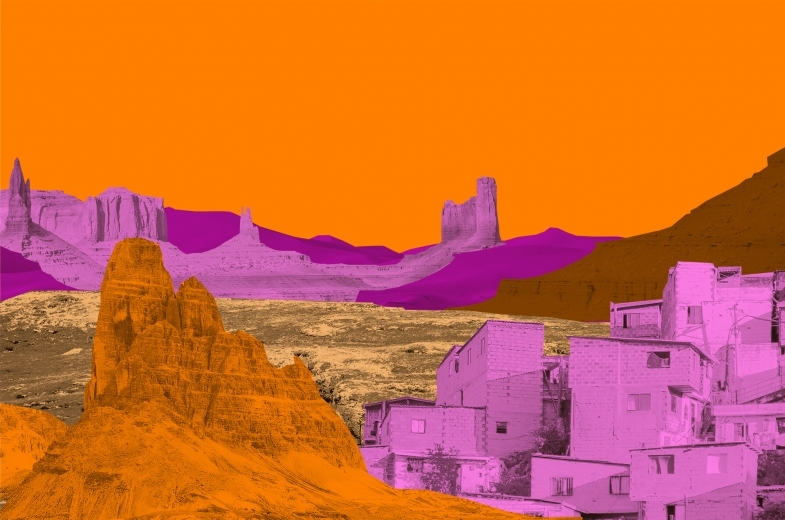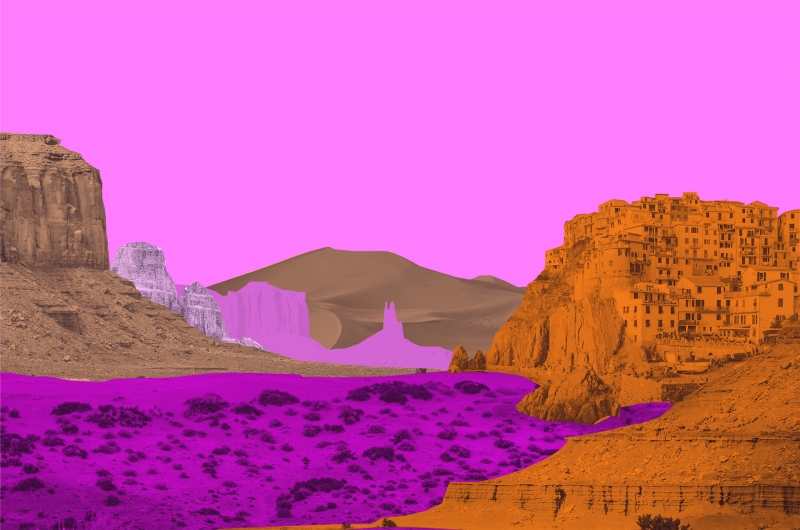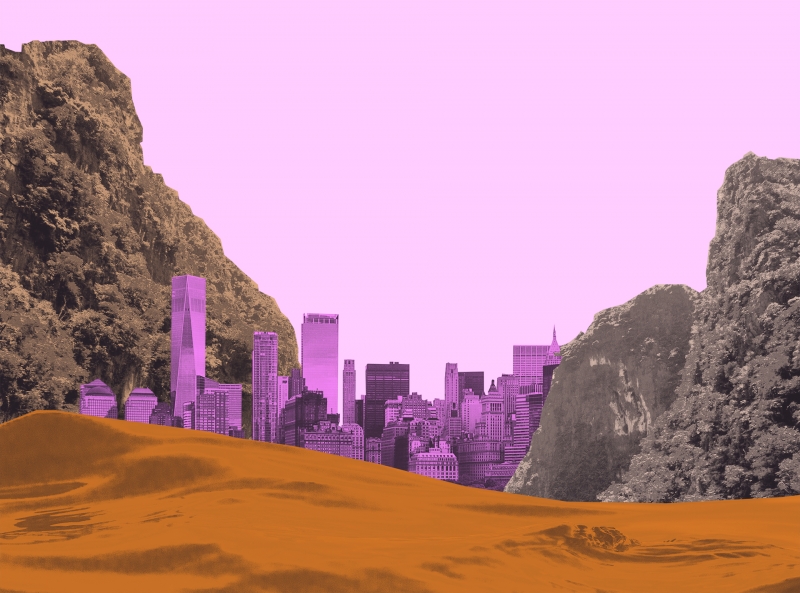Climate Justice in the Time of Green New Colonialism
Interview with T. J. Demos, chair and chief curator of maat’s Climate Collective 2021–2022, by Mafalda Ruão for Umbigo Magazine #80

Illustrations: Lisa Hartje Moura.
We think that in being, a solid and steady existence awaits us. And, as cheery as it is to say “Carpe Diem”, perhaps we should try picture the end of things as we put our best foot forward. But there seems to be a natural human inability to think about its eventual demise. How does one explain the refusal of human beings to confront and acknowledge climate instability and environmental abuse? Scientific evidence highlighting the need to wean itself off fossil fuels is not enough; the extent of the crisis demands a socio-environmental approach as the most important tool to fight climate change, were it not for the fact that the world is a complex web of socio-political and techno-economical interests. Today, there are dissenting voices and guiding lights able to point out unsustainable practices, to delegate and define more productive and respectful courses of action. However, the question still remains: can art help us see what’s wrong? Can it mobilise? Or lead us to change?
From the union between maat Explorations and the Climate Collective in 2021, Climate Emergency > Emergence was born. It is a multidisciplinary programme that, through research and artistic, analytical and speculative experimentation, has galvanised climate emergence by embracing a positivism that goes beyond catastrophe theory. Climate Collective – consisting of T. J. Demos (USA); Molemo Moiloa (South Africa), Susan Schuppli (UK) and Paulo Tavares (Brazil), experts in the broad field of contemporary art, design and technology – in partnership with other names at the crossroads of experimental arts and political ecology, have merged creative practices with ecological thinking and political decision-making, in the name of social and environmental justice. More awareness and expression is needed; and for art to reflect the problem, overcome climate change denial. Above all, in order to awaken creativity, the capacity to imagine what we most fear is the essential component to transcend what we utterly dread.
Mafalda Ruão
What were the objectives of last year’s programme and what was achieved?
T. J. Demos
Rather than viewing climate emergency as uniquely situated in the near future, we insist on connecting present anxieties over climate breakdown to long histories of socio-environmental violence. Enlivening a public arena of collective debate, Climate Emergency > Emergence asks how we can move from climate emergency (the catastrophe of an Earth-systems breakdown as much as failed sociopolitical arrangements) to climate emergence (generating new forms of life founded upon social justice and environmental wellbeing). Among our central questions: What reparatory climate futures are necessary once we adopt greater historical sensitivity to socio-environmental emergencies? In what ways do technologies of sensing not only observe climate transformation, but construct objects of knowledge, science, and politics? How and why does climate justice require not simply decarbonisation but decolonisation? How do the anti-racial-capitalist politics of abolition—which articulates social justice demands for the end of policing, mass incarceration, and of militarisation more broadly—extend to ecological and multispecies concerns? With these, the Climate Collective, with a range of guest speakers, assembled a remarkable year of events, a significant conceptual headway in theorising what “climate emergency” is from a range of perspectives, and mapping out diverse ways of considering the emergence of alternative world-building practices.
Mafalda Ruão
Can we elaborate on that? Why and how does climate justice require not only decarbonisation but also decolonisation?
T. J. Demos
Colonialism was achieved with tremendous social and environmental violence, and has left us with a world of racial hierarchy, genocidal domination, and climate breakdown. According to cutting-edge research, environmental transformation wasn’t accidental to colonial conquest, but was part of its very telos. Anyone who defends colonisation as a modernisation project fails to address its ultimate outcome: climate breakdown that threatens the end of civilisation itself, as many scientists, social scientists, and environmental humanists recognise. To consider decarbonisation without decolonisation is akin to proposing that we greenwash racism, economic inequality, social violence, and poverty. As such, green capitalism represents nothing less than green new colonialism. To see decarbonisation as inextricable from decolonialisation is not simply a matter of ethics or justice: it’s also strategic. If we are to build the social movements capable of actually overcoming the massive political and economic interests of fossil capital, then we need to assemble an intersectional movement of movements, in which all diverse stakeholders are represented.
Mafalda Ruão
How to effectively act upon the effects of climate catastrophe regarding geographical, socioeconomic and cultural disparities, which reveal non-proportional consequences and vulnerabilities in different regions of the planet?
T. J. Demos
Our project begins with the fidelity to climate justice principles, according to which any proposed solution to environmental breakdown must include the frontline stakeholder communities in the policy discussions. We know that climate change hits some communities and some regions harder than others, in part because those communities don’t have access to the resources and technologies available elsewhere. Climate justice is thus based on prioritising climate debt: the socioeconomic and technological obligation owed by those regions—such as Europe and the US—who have used up the world’s carbon budgets—to those other regions—largely in the Global South—who are suffering some of the worse impacts of climate breakdown but who have little responsibility in creating those conditions. The problem is, however, that global climate governance (such as COP26) is dominated by wealthy developed G8 nations and their corporate enablers, basically keeping climate debt off the table. To effectively act on climate change disparities requires democratising climate governance, which entails overcoming the domination of politics by capitalist interests. That is no easy goal to achieve, but meaningful climate justice is not possible without it.
Rather than viewing climate emergency as uniquely situated in the near future, we insist on connecting present anxieties over climate breakdown to long histories of socio-environmental violence.
T. J. Demos

Mafalda Ruão
One thing is climate crisis, another is the biodiversity crisis. How can art contribute? In other words, in what ways can visual and media arts, rather than only pointing out or observing the crisis, engage in knowledge-building and stimulate decisive actions, that would finally redirect and strengthen relationships with all living beings?
T. J. Demos
In recent decades there has been a resurgence of artistic experiments in alternative-world building, providing small-scale models of environmental caretaking poised against the extractive violence of fossil capital. These often recognise and connect to longstanding Indigenous practices that centre multispecies relationality over the objectifications and colonisations of nature by capital. Within our programme we discuss several projects: the practice of Tabita Rezaire and her current project of Ambaka, where she is not simply “observing the crisis,” but providing a template for how to “redirect and strengthen relationships with all living beings.”; there’s the Zad in France, the largest autonomous zone in Europe, where artists, agricultural workers, and many others are attempting to actualise ecological sustainable practices; there’s Cooperation Jackson, in Mississippi, where a largely African American community is attempting to create a “solidarity economy” that joins collective self-determination, anti-racist equality, and eco-socialism; and there’s the project Forest Law of Ursula Biemann and Paulo Tavares, which documents the juridico-political approach of micro-Indigenous communities like the Sarayaku in the Ecuadorian Amazon that have turned to the rights of nature in order to fend off the incursions of extractive fossil-fuel corporations and the Ecuadorian neo-extractivist state.
There is no shortage of experimental eco-artistic examples in nearly every region of the world. Which dramatises the conclusion that the lack of cultural imagination in living otherwise is not the problem: rather, it’s the militarised defence of the corporate interests of the political and economic ruling class that, in enforcing the conditions of racial and colonial capital, ultimately stands in our way and is leading us all down a path of collectively assured destruction.


Climate Emergency > Emergence, maat paper, 2021.
Mafalda Ruão
Turning our attention from the meta level to the contemporary art world and its own responsibility towards this issue, if we refer to the behind-the-scenes of exhibitions, festivals, events, what we produce, the materials we use, the waste we generate, etc… do you think we have sustainable solutions and are they already being implemented?
T. J. Demos
Perhaps the clearest solutions in this regard are modelled by those who refuse to participate in the unsustainable fossil economy of the cultural sector (for instance, those at the Zad who refuse to fly, and tie in their every artistic decision to ecological impacts). For sure, the arts industry is immanent to the global system of fossil capital. We won’t ultimately be able to realise viable alternatives except as spaces of negativity within that system. The challenge is, and the answer can only be, ultimately, global system change, or the Great Transition, or the global Green New Deal, as it’s variously called. Perhaps there are valid strategic reasons to continue participating in the unsustainable system of exhibitions, festivals, and events—for instance in the interests of radical education as a mode of building collective power to overturn the very system in which its embedded—but in the last analysis artistic infrastructure will also need to reflect socio-environmental imperatives, or threaten our collective survival.
Mafalda Ruão
What are the main roles and responsibilities of the curators/designers/artists facing climate catastrophe?
T. J. Demos
Some emergent artistic imperatives that come to mind: bringing critical attention, testimonials, and forensic analysis to the structural and systemic causality of climate breakdown and its socio-environmental impacts; centre practices of creative alternatives offering new images and stories that inspire horizons of imagination beyond fossil capital and its systems of oppression; provide networking infrastructure between artists, creative practitioners more broadly, and social movements—such as the Progressive International—in moving beyond the traditional role of art as individuated self-expressions producing object-oriented luxury items for elite investment, and toward surging collective participation in climate justice struggles in the interests of collective survival; challenging the terms of eco-fascism, and the reactionary rise of right-wing extremism supporting the interests of white supremacy.
The challenge is, and the answer can only be, ultimately, global system change, or the Great Transition, or the global Green New Deal, as it’s variously called.
T. J. Demos
Mafalda Ruão
Recently more and more articles, studies and news stories depict the climate crisis. Is there any risk that the public will become immune to the message?
T. J. Demos
The risk, in my view, is in the way they depict it. In doing so, much mainstream climate discourse succumbs to the rising hegemony of green capitalism, forwarding the idea that society can mitigate climate change disaster through technofixes and neoliberal market-based mechanisms. These are false solutions, as many have pointed out, and as I explain above, they narrow our definition of climate change so that social, political, and economic inequality is left untouched. This is the conflict we must confront and engage. The risk is of a public immune to the message of eco-socialism.
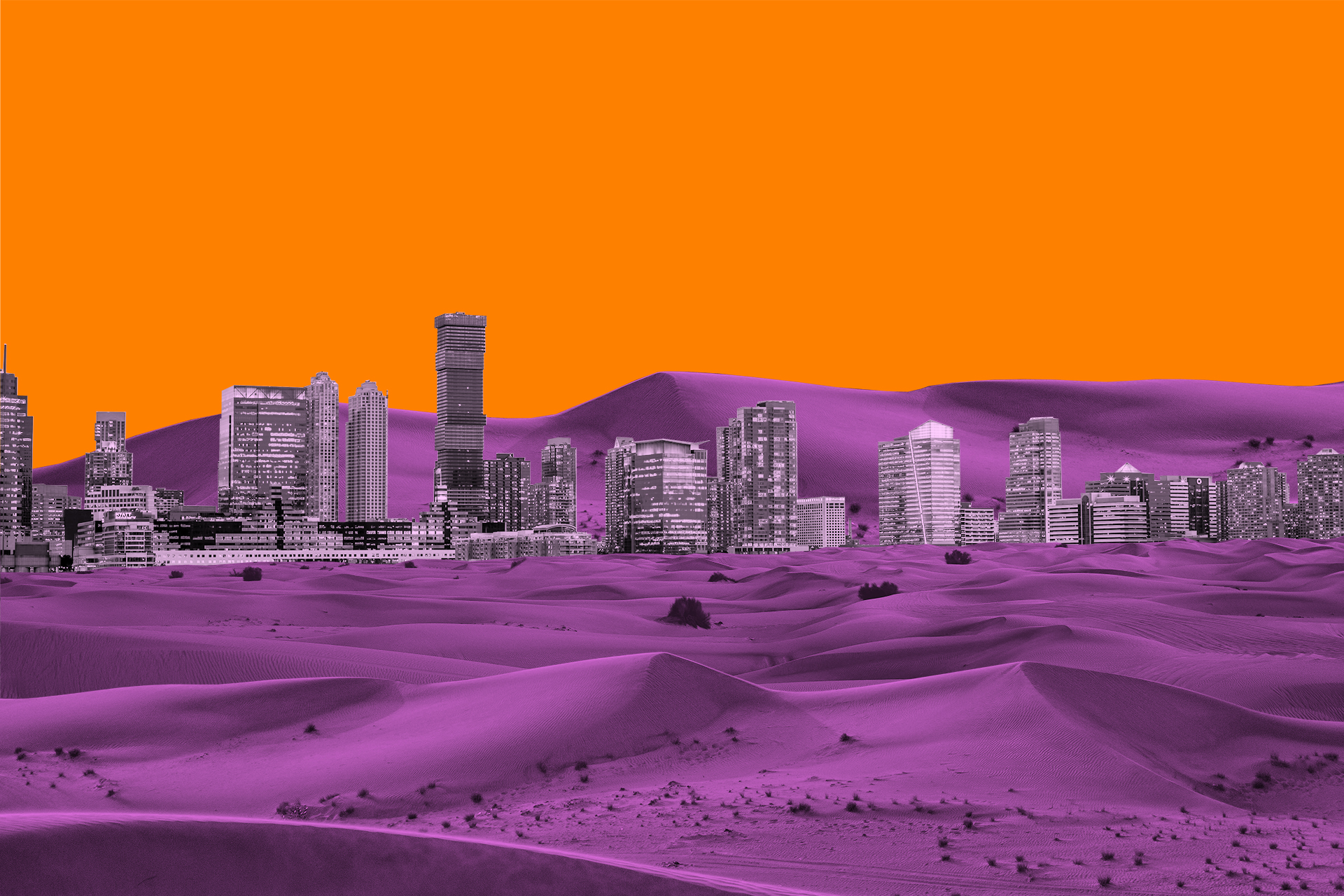
Much mainstream climate discourse succumbs to the rising hegemony of green capitalism, forwarding the idea that society can mitigate climate change disaster through technofixes and neoliberal market-based mechanisms.
T. J. Demos
Mafalda Ruão
Sometimes I think the main problem in our societies is the lack of empathy and critical thinking. Can we still believe in the goodness of human nature and its capacity to anticipate the catastrophe and act accordingly?
T. J. Demos
It’s not surprising that the system of fossil capitalism has targeted education for structural adjustment, opposing the longstanding enlightenment project of universal and free education for all. As economic precarity grows, fewer people have the option of gaining secondary education, as university fees and living costs become unaffordable to the many, or invite a vicious cycle of indebtedness, as we see in the US, where public education increasingly collapses into the private model. The result is new generations of technocracy, with students acquiring technical training without concerns for empathy or critical thinking. For me, it’s crucial not to naturalise humans, but rather to see humanity as, to some degree, deeply impacted and shaped by material conditions and dominant systems. In this regard, we are all, in differentiated ways, fossil subjects, formed by centuries of extractive capitalism. But so too is it necessary to avoid any kind of deterministic fatalism. Those who have suffered the oppressions of our dominant economic systems are already well familiar with the ongoing catastrophe, and often possess the most touching and inspirational capacity for empathy alongside criticality. If eco-socialism ever prevails, it will come from those—from the ranks of the working class—who have suffered the most, not from the elites who have nothing but more inequality and oppression to sell.
Mafalda Ruão
What can we expect of a next edition?
T. J. Demos
More of the same. Integral to our initiative will be to explore how and why socio-environmental approaches foreground social justice, decolonial thinking, and critiques of racial capitalism matter to climate policy. In addition, we’re interested in building more bridges between science and technology and artistic approaches, where interdisciplinary practice becomes speculative, creative, and politically ambitious.
Umbigo Magazine is a quarterly printed magazine with a curatorial dimension. It features editorials, special art projects, art dialogues and essays, exhibitions reviews, in-depth interviews, among other, and it has two editions, in Portuguese and in English. The publication also consists of, and much more. The covers are the result of art projects specially made for the magazine. But Umbigo is also an independent art and culture platform, which includes a daily online publication, a social network for art and a programme of various curatorial activities. Building on themes such as contemporary art, fashion and culture-related subjects, with no regards to geographic nor time boundaries, Umbigo values the artists’ work and creations by adopting a transparent approach, being a resource for Portuguese and selected international contents.
The interview with T. J. Demos by Mafalda Ruão was originally published in the Umbigo Magazine #80, in the first quarter of 2022.
T. J. Demos, chair and chief-curator of maat’s Climate Collective 2021–2022, is an award-winning writer on contemporary art, global politics, and ecology. He is a professor in the Department of the History of Art and Visual Culture at the University of California, Santa Cruz, and Founder and Director of the Center for Creative Ecologies. His work centres broadly on the conjunction of art and politics, examining the ability of artistic practice to invent innovative and experimental strategies that challenge dominant social, political, and economic conventions.
The Climate Emergency > Emergence public programme initiative energises critical analyses and creative proposals in moving beyond catastrophism and toward the emergence of environmentally sustainable futures. Interdisciplinary in breadth and international in scope, the programme is conceptualised by the newly-formed 2021 Climate Collective: T. J. Demos (USA), chair and chief-curator, Molemo Moiloa (South Africa), Susan Schuppli (UK), Paulo Tavares (Brazil), geared toward assembling diverse cultural practitioners working at the intersection of experimental arts and political ecology.
maat Explorations is a programme framework featuring an ongoing series of exhibitions, public and educational projects delving into the multi-faceted subject of environmental transformation from various scholarly and experimental vantage points – it brings philosophical and political perspectives forward, as well as sociocultural and technological investigations interwoven in speculative and critical practices in the arts and design at large.




